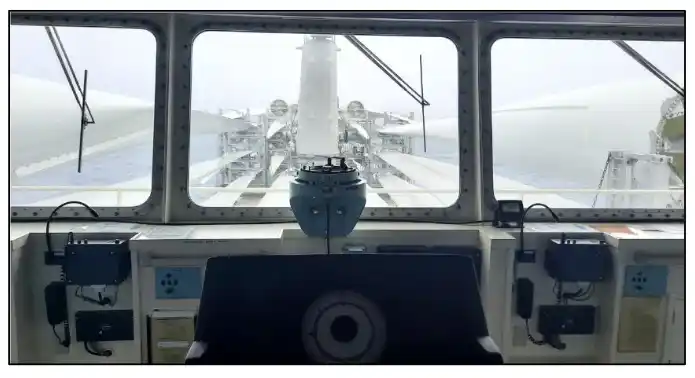The Coast Guard Inspections and Compliance Directorate has released Marine Safety Information Bulletin 04-23, to advise mariners that an increasing number of break-bulk and retrofitted bulk carriers are arriving in the U.S. carrying wind turbine parts stowed in a manner that substantially limits visibility from the navigation bridge. Many of these vessels were issued dispensation letters by their flag administration or recognized organization that temporarily exempted compliance with the International Convention for the Safety of Life at Sea (SOLAS) 1974 Chapter V, Regulation 22, which specifies requirements regarding navigation bridge visibility standards.

 In some cases, flag administrations have issued dispensations of SOLAS V/22, despite the vessel’s intended voyage requiring substantial transit within restricted navigational channels and confined inland waterways with congested maritime traffic.
In some cases, flag administrations have issued dispensations of SOLAS V/22, despite the vessel’s intended voyage requiring substantial transit within restricted navigational channels and confined inland waterways with congested maritime traffic.
Dispensation letters issued by flag administrations or recognized organizations do not exempt vessels from complying with corresponding U.S. requirements on navigation bridge visibility found in Title 33 Code of Federal Regulations (CFR) § 164.15. Operators of vessels that do not comply with U.S. regulations for navigation bridge visibility must notify the local U.S. Coast Guard Sector before the vessel enters U.S. waters and request to deviate from the rule. In accordance with 33 CFR 164.55, upon written application, the Captain of the Port (COTP) may authorize a deviation from the rules if the deviation does not impair the vessel’s safe navigation under anticipated conditions and will not violate the rules for preventing collisions at sea. The COTP may authorize, deny, or require additional mitigation measures. The COTP may alternatively issue a COTP Order or take other appropriate actions in accordance with their authorities. The U.S. Coast
Guard does not typically grant deviations for situations intentionally counter to the regulations or solely for convenience or financial incentive.
Vessel owners, operators, flag administrations, and recognized organizations should ensure adequate voyage planning, including selecting appropriate cargo stowage arrangements and verifying that the vessel will
comply with all mandatory rules and regulations.